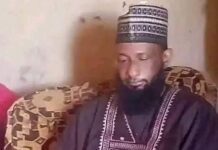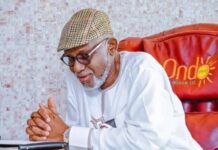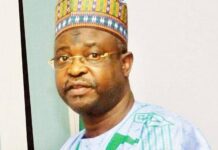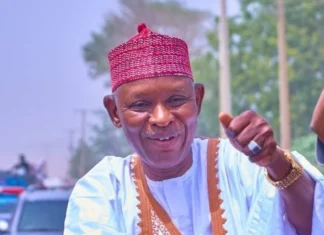By Chris Paul Otaigbe
Although the news, emotions and euphoria of the transition of the Late Obi of Ogwashi-Uku who passed on September 13, 2019 may have calmed, but the storm of his immortality began the day the news of the death of Chukwuka Benjamin Okonjo became public.
His activities would definitely outlive him because he made his life a seed he sowed into people’s lives and in service to community and humanity.
Chukwuka was a mathematician to the core; in thoughts, deeds, logic and vision. He lived his days without compromising the mathematical formula of life and living.
For him two plus two must be four, no more no less. Little wonder, arithmetic never failed in ensuring all he touched added up to the sum he projected in the course and cause of his existence.
As if to proclaim this divine ordinance and perpetuate an existential continuity, he named his third son, Ifechukwude, meaning, what God has destined?
That little child, among his other children, he obviously nurtured to succeed him post transition, which may have been why there were no complications when Ifechukwude immediately took over from him as the Obi of Ogwashi-Uku Kingdom in Aniocha South Local Government Area, Delta State.
Like one who had planned everything to the very end, Chukwuka left this life to join his ancestors from Lagos soon after he arrived from a trip to the United States of America and Ghana.
Without causing his children the usual stress of old age, he departed the earth peacefully, just the manner in which he lived his life, as his daughter, Mrs. Ngozi Okonjo-Iweala, stated, with quiet dignity.
Born to a father, who used to be a teacher working with the Nigerian Railway Corporation (NRC) in Lagos, Chukwuka is happy he had parents who liked and did things for himself and his younger siblings.
Professor Chukwuka Benjamin Okonjo is the father of one-time Nigeria’s Minister of Finance and Coordinating Minister of the Economy, Ngozi Okonjo-Iweala. He was the immediate past Obi of Ogwashi-Uku in Aniocha South Local Government Area of Delta State. Prof Okonjo joined the United Nations System in 1974 in New York and was posted as the Director of the Regional Institute for Population Studies (RIPS) at the University of Ghana, Legon, Accra.
He worked as a Professor of Economics at the University from 1974 to 1985 at the time the country was going through economic and political difficulties. During that time, Prof Okonjo installed the first African Population Information Network ((APIN), popularly known as the Population Information and Documentation System for Africa (POSA), valued at $350,000.
Besides being the Pro-Chancellor of the University of Ilorin, Kwara State, he was an adviser to the University of Nigeria Nsukka (UNN). The 91-year-old economist and mathematician can best be described as “a cat with nine lives” having suffered stroke thrice and was still walking around, which he said “shocks doctors” whenever he goes to Europe for medical check-up.
An accomplished man on so many levels, he was highly respected as an academic, international public servant, university administrator, intellectual and traditional ruler.
At 90, despite the disfiguring wrinkles of age, Chukwuka could still speak well and conduct long conversation without reflecting the stress that comes with aging.
Incidentally, he had three bouts of strokes. In an interview he conducted a year earlier, he said “by all the rules of the game, I should be dead. But I will be leaving for Europe very soon. When they tell them he’s had three strokes every doctor is shocked and says three strokes? He ought to be in the ground, buried and not walking around.”
Many in his class and to some extent, age would have preferred to live quietly in their village without impacting meaningfully on the lives of their people. But a humanitarian Chukwuka ensured he was not tainted by the mess politicians and so- called elite carry around to the detriment of the people. He decided to show and lead by example.
For instance, the issue of water for the villagers: At some point “the government wanted to give Ogwashi-Uku water and they assigned N441m. I looked at what they did and smiled.” He said.
He, then, set up a project so that 12 towns and villages can have water. “The project is there. I can show you. But I don’t shout it all over the place. The dam is there. But don’t forget, people forget little villages because they don’t have anyone to speak for them. If you are a little village and you don’t have a big man, an expert, who will talk for you then you don’t get attention. All these Ph.D. holders are experts who surround the governor but they may not advise him correctly; so that’s the problem.” Affirmed Chukwuka.
His experience at the United Nations was one that defines the visionary and solution-provider that he was wired to be.
He was just over 40 years at the time. Usually every man or woman reaches their peak between 40 and 65; which is when they are at their best. After that the downward slope of performance sets in. “And then you get to a stage when you keep performing instead of learning and being taught by other people. You get to your peak and then you start descending. And, of course, a lot of people don’t know when they should get off; there might be other people performing better than them. And then the people who are in charge are not necessarily the best in that position. So, if you know you are diminishing in effort, then you give up and go into retirement. I’m at that stage now.” He said.
At the UN, he was placed in Ghana – the UN wanted to teach the people how populations grow and migrate. So, they persuaded the Ghana government to start an institute or department they called the Regional Institute for Population Studies (RIPS). The Ghanaian government didn’t quite agree. They said they had no money. “So, the UN said, “OK, we will support you and when the thing grows, as you have more money, you take over.” He said.
Then they called him to come and run the institute and by the time he was through, they were no longer in the position they had been. The UN held on to it because they said the project was so good; it was doing wonderful research. So, they made what was to be the Department of Demography or Department of Population Studies of the University of Ghana; but they turned it into a United Nations Organization (UNO).
“So, RIPS is located at the University of Ghana but is not part of it; it is a UNO, like the UN itself, FAO, UNEP, UNPN, UNDP, and so on. So, it’s wholly a UN body; I mean established by statute of the United General Assembly of the UN. In short, RIPS is on the same rank with FAO, UNEP, UNESCO, UNICEF and so on; though on a lower scale.” He said.
At the RIPS, Chukwuka did his work rather well, producing about four times his deliverables, at a higher and more qualified level. Impressed with his efficiency, he was honored in the tradition and fashion of the global organization.
“When you retire from the UN, if you’ve done very well, they give you an extra job. I became a big expert chosen to go to the Soviet Union to lecture to them, tell them things; do the big things like sitting in the box next to where the head of the place normally sits.” He said.
Applying the mathematical formula that had guided his life, this great son of Ogwashi-Uku ensured that he trained his children to the point where they would meet and surpass his achievements and space on the global stage. This was perfected and manifested in his relationship with the UN as the global body’s recognition of his great feats in their fold has rubbed off on his daughter Ngozi Okonjo-Iweala.
“They honored me that way and they are doing the same to my daughter, Dr Ngozi Okonjo-Iweala. You know my daughter used to be the woman who ran the World Bank. If it wasn’t for the politics, she should have been President of the World Bank.” Said, the proud father.
So, when he left, he worked briefly in Ghana before he was able to persuade the UN to bring him back, because they wanted to bring him back according to their rules. So, since he was in Ghana, he decided to load a lorry, take a ship from Accra, that’s Thelma, come to Nigeria and then unload in Lagos into a car or lorry and then bring his belongings to Ogwashi-Uku. But he wanted that changed. “And they insisted it was done according to their rule. I said your rules would cost you more and would be very uncomfortable for me because Ghana and Nigeria were not too far apart.
The lorry could take me straight from Ghana to my village. It took about one year to persuade the UN to agree that I was right and what I was saying was sensible.” He said. When UN finally agreed, Chukwuka chartered a lorry and it drove straight from Ghana, passing through Benin Republic and Togo to Idiroko and then through Abeokuta and then to his hometown. “And since then I’ve been here. I lectured partly for the University of Nigeria; then I had to resign because I was getting old, but they thought I was still useful. So, I became their adviser and I’ve been advising them since then.” He said.
He was asked later in his life to be the Pro-Chancellor of the University of Ilorin, Kwara State. “As the pro-chancellor, I go there once every four years or four times a year. So, I can only advise the man who is running the place; they take me round and I see things. I’m always startled at some of the things I see because I give them advice which they don’t quite take.” He confessed.
A man of great educational and intellectual pedigree, Professor Okonjo held:
▪ BSc Mathematics, London, UK
▪ Msc Mathematics, Erlangen, Germany
▪ MSc Economics, Erlangen, Germany
▪ Phd Mathematical Statistics, Cologne, Germany
In the course of his rich and rewarding career, he served in many positions, including:
▪ Mathematics and Science Teacher, Government College, Umuahia
▪ Mathematics and Science Teacher, Western Boys High School, Benin City
▪ Principal, Ibadan Boys High School, Ibadan
▪ Co-founder of the Centre for Demography at the University of Ibadan
▪ Senior Lecturer, Department of Economics, University of Ibadan
▪ Principal Lecturer, Statistics, University of Ibadan
▪ Brigadier and Head of the Biafran Organization of Freedom Fighters (BOFF) during the Nigeria/Biafra Civil War
▪ Professor of Mathematical Economics, University of Nigeria, Nsukka
▪ Founder, Institute of Demography, University of Nigeria, Nsukka
▪ Head, Department of Economics and Dean of the Faculty of Social Sciences, University of Nigeria, Nsukka
▪ Founder and Director of the Center for Population Studies, University of Nigeria, Nsukka
▪ Economic Adviser, Economic Commission for Africa (ECA)
▪ Professor of Economics, University of Ghana, Legon
▪ United Nations Director of the Regional Institute for Population Studies (RIPS), located in Accra, Ghana
▪ Education Adviser to the Government of Ghana
▪ Founder, Double Intake educational system (adopted by the Ghanaian Government)
▪ Member, Nigerian Economic Society
▪ Member of the Board of Trustees and Life Patron of ASUU
▪ Pro Chancellor, University of Ilorin
On his 90th birthday last year, a delegation of old students of Ibadan Boys High School presented him with a letter of commendation written in 1953 in which a colonial education administrator praised him highly for the all-round improvements he achieved in the school within a short period of time. He was only 25 years old then.
A passionate intellectual and prolific writer whose last book was published at the age of 90, Chukwuka touched so many lives personally and professionally and was an unrelenting believer and practitioner in the power of education to transform lives.
In pursuit of this commitment, Chukwuka sponsored the education of at least 19 students up to university level in addition to his own seven children. He inspired and motivated so many more.
Having witnessed the ravages of war, he was committed to unity and peaceful coexistence of all. From his marriage of 66 years to Professor Kamene Okonjo to his dedication to duty, the late Obi of Ogwashi-Uku was exceptional.
Obi Chukwuka Okonjo, who ascended the throne as the traditional ruler of Ogwashi-Uku in 2007, was a renowned professor of mathematics was also an astute education administrator and prolific author of many mathematics and general science books.
Okonjo began his education at the age of six at the government school in the town of his birth Ogwashi-Ukwu. In the following year, 1935, his family moved to Lagos and he went to the Ladi-Lak Institute, Yaba, Lagos. This school had only been founded one year earlier, on June 4, 1934, by the lawyer Rita Akaje Macaulay. It was a small primary school with only four pupils in its first year. Okonjo was at this school for three years until 1938 when he went to the government school, Lagos where he spent the academic year 1938-39.
In 1939, Okonjo began his secondary education at King’s College, Yaba, Lagos. This school, established in 1909, aimed: –
… to produce students of profound character and academic distinction – men who would build an independent Nigeria.
In 1944, Okonjo moved from there to the Dennis Memorial Grammar School, Onitsha where he spent the year 1944-45. This school, founded and run by the Church Mission Society, was established in 1925, nearly 70 years after the Society began its mission in the area. This long delay was due to the Society believing for a long time that its role was the propagation of Christianity for which secondary education was not necessary. By the time Okonjo attended the school, it had made great efforts to provide top quality science teaching in line with government policy. E D C Clark was principal at this time and had improved standards. Okonjo was awarded University of Cambridge Overseas School Certificate in 1945.
The Higher College, Yaba, had been founded in 1932 and the most brilliant pupils from the Dennis Memorial Grammar School went there to follow higher academic courses. Okonjo followed this route, attending Higher College, Yaba from 1946. This college, opened in January 1934 in Yaba, a town which has now become a suburb of Lagos, was a men’s college which was affiliated with the University of London, England. The college trained science teachers and offered diplomas but students wanting higher education had to study correspondence courses and obtain degrees from the University of London.
Okonjo attended University College, Ibadan in 1948-49, but registered for correspondence courses with the University of London. University College, Ibadan, was established in 1948, the year Okonjo began his studies there, as a College of the University of London, being the first university to be established in Nigeria. It became an independent university, the University of Ibadan, in 1962 after the country gained its independence from Britain. Okonjo was awarded a Diploma in Education in 1949.
His studies as an external student of the University of London from 1948 to 1951 led to Okonjo being awarded a B.Sc. in Mathematics, Logic and Scientific Method in 1951. He had studied as a University of London external student while teaching at various schools in Nigeria. He had been a Tutor at Government College, Umuahia (1949-50), a Tutor at West Boys High School, Benin City (1950-51), and Principal of Ibadan Boys’ High School (1952-55).
He was also an activist of the Academic Staff Union of Universities (ASUU) in Nigeria.
He was alive to watch and see his daughter, with pride, accomplish greater achievements than he did. Surely, he must have something to say about his country in which his daughter served as Minister of Finance and Coordinating Minister for about ten years cumulatively, in two governments.
The Late Obi minced no words in asserting the fact that a major challenge retarding Nigeria’s development is due to the laziness of Nigerians especially the youths.
“Youth laziness; I’ve been in virtually most countries of the world. And compared with other countries, we are lazy and don’t make use of the resources that we have or we make use of them wrongly. And we don’t want to listen to people.
If you work with the army, the top man gives the orders. You have no business questioning what he says; you just carry it out. That is why they say democracy is better because everyone keeps speaking their mind. And you don’t punish them when they say things you don’t like. Then in arriving at a conclusion and what should be done: you see as many values as possible; your decisions can be right or wrong.”
According to him, there are a lot of things which people don’t see and also considering the different point of views arising from the premise that each group has its own politics; “you want to be on top; he wants to be on top. So, you find ways to pull your friend down, so that you are on top. And the group, all of us, has to decide who should be there. So, if we all participate, fine, but you individually give your decisions when you are better educated. The more you know, the better you can decide. You can’t have two thirds of the country being illiterate – the women – and the men being in leadership; it doesn’t mean they have all it takes or are better than the women.” Said, Chukwuka.
He maintained that every country must be ruled by people who must be first class but they must listen to the people behind them if they are in a democracy. “So, they can be right or wrong in whatever choice they make. But how people feel can be of very great importance in their giving a judgment. The judgment I will give you will not be the same judgment the president will give you. He might have travelled more than I’ve done but I’ve studied the problem of development much more than any other president here. I can say what I like, yet I don’t have any power. I can’t say do this. I cannot because I don’t have the instrumentality of pushing it through. But the president can say do this; it might be wrong or right, but we do it.” He said.
Many of the policies of government have obviously failed to deliver on their stated objectives. In the light of this, could there be any economic policy which he thinks can be reviewed?
The great Economist believed if government can review its policies of development, the economy can grow faster, “but that is not what is happening now, although I’m not a governor. If I’m a governor, I will do something different. I’m not a president. I have no authority. So, there are many things we can do better.
In the first place, if you want to develop, you must work harder than you’re working now.” He said.
On a final note, there are some things Chukwuka believed he would do differently should his Maker give him the opportunity to return to this world a second time. “I now realize there are many things I could have done in a slightly different way, but generally as compared with people here, there isn’t much to regret. My time is spent trying to bring it to bear on people.”











